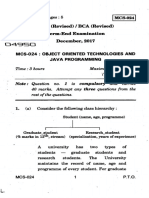0% found this document useful (0 votes)
35 views12 pagesInheritence Example
The document discusses inheritance in Java through multiple examples:
1. It shows a Vehicle class being extended by a Car class, inheriting attributes like color and speed, and adding its own attributes like CC and gears.
2. It demonstrates making attributes private in the parent Vehicle class and accessing them through getter/setter methods in the child Car class.
3. It provides an example of constructors and inheritance, with a Shape class extended by Rectangle and ColoredRectangle classes, showing how to call parent constructors.
4. It shows method overriding, with a Shape class's showAttributes() method overridden in Rectangle to also display the type attribute.
So in summary, the document covers key
Uploaded by
shaheena.atasCopyright
© © All Rights Reserved
We take content rights seriously. If you suspect this is your content, claim it here.
Available Formats
Download as DOCX, PDF, TXT or read online on Scribd
0% found this document useful (0 votes)
35 views12 pagesInheritence Example
The document discusses inheritance in Java through multiple examples:
1. It shows a Vehicle class being extended by a Car class, inheriting attributes like color and speed, and adding its own attributes like CC and gears.
2. It demonstrates making attributes private in the parent Vehicle class and accessing them through getter/setter methods in the child Car class.
3. It provides an example of constructors and inheritance, with a Shape class extended by Rectangle and ColoredRectangle classes, showing how to call parent constructors.
4. It shows method overriding, with a Shape class's showAttributes() method overridden in Rectangle to also display the type attribute.
So in summary, the document covers key
Uploaded by
shaheena.atasCopyright
© © All Rights Reserved
We take content rights seriously. If you suspect this is your content, claim it here.
Available Formats
Download as DOCX, PDF, TXT or read online on Scribd
/ 12
























































































